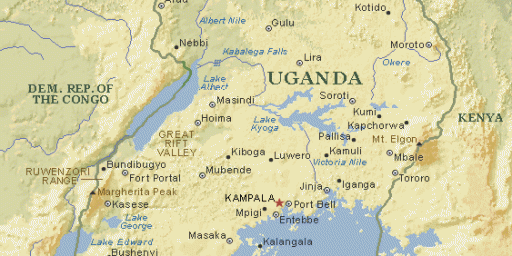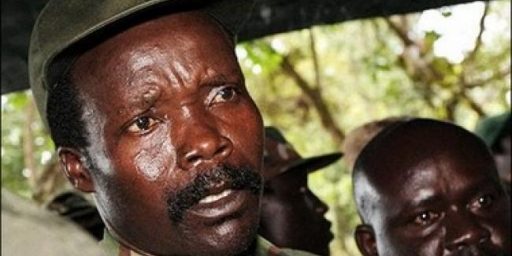The USA and the LRA
This is looking less crazy, less sudden, and less an exercise in presidential whimsy than it seemed.
Friday’s announcement that President Obama was trending troops to fight the Lord’s Resistance Army in Central Africa was meant with a near-universal Whiskey Tango Foxtrot. As the dust settles, however, this is looking less crazy, less sudden, and less an exercise in presidential whimsy than first met the eye.
My Atlantic Council colleague Peter Pham has a superb analysis of the background (“Assessing the Hunt for the LRA“) over at New Atlanticist. While expressing some reservations about the wisdom of the intervention and stating categorically that “The LRA has no capacity to pose a direct security threat to the American homeland or even the nearest US forces,” he nonetheless makes a strong case that this is not simply some fool’s errand.
First, while the LRA may not pose a real threat to the United States, it has wreaked havoc with some of America’s closest African partners, including Uganda, the main contributor to the African Union Mission in Somalia (AMISOM) which is the only thing standing between that country’s weak interim authority and its total defeat at the hands of the al-Qaeda-linked al-Shabaab insurgents, and South Sudan, the continent’s newest state which came into being earlier this year largely through US and European diplomatic persistence. These countries have appealed for assistance. While the United States itself has provided over $40 million in logistical support, equipment, and training since 2008 to assist regional militaries in their operations against the LRA operations, this has not been sufficient to end the rebels’ depredations. In June, the African Union appealed for external support for a regional task force to tackle the challenge.Second, not only are the African countries bearing the brunt of the LRA’s violence allies, but they also are rich in natural resources which cannot be developed to their benefit or that of their trading partners because of the conflict. South Sudan sits on top of Africa’s fifth largest proved petroleum reserves, while Uganda is on the cusp of production of oil along its border with the DRC. The latter country has the world’s largest reserves of cobalt and vast quantities of diamonds, gold, copper, uranium, and other minerals, while the CAR has also significant, but mainly unexploited, deposits of many of the same.
Much more at the link but the bottom line is that there are strategic interests for the United States and our European allies to care about the region in general and the LRA in particular. Ultimately, he concludes,
[I]t will be the right choice as long the mission remains focused on the goals outlined by the president and limited in its scope to those highly specialized tasks that Special Operations Forces are so expert while leaving the principal operational responsibilities on the host militaries—and there is every reason to think such will be the case given that that Special Operations Command Africa is nowadays headed by Rear Admiral Brian Losey, a Navy SEAL who previously commanded CJTF-HOA and thus not only knows the region well, but also that what is needed there is a very light American footprint and more enhanced African capacity. If such proves to be case, ending this bush war and all the suffering it has caused will not only be consonant with humanitarian ideals, but will also advance some very real strategic interests.
Despite the early reporting when the news broke Friday, this looks very much like a limited military advisor mission rather than a “kinetic” foray into warlord hunting a’la the bad old days of Somalia. Yes, America’s involvement in Vietnam started that way. But Peter’s right: there’s no reason to think that this will escalate.
Additionally, it’s worth noting, as Scott Lemieux does this morning, that with the LRA Disarmament & Northern Uganda Recovery Act of 2009, Congress “unambiguously authorized” this action.
…providing political, economic, military, and intelligence support for viable multilateral efforts to protect civilians from the Lord’s Resistance Army, to apprehend or remove Joseph Kony and his top commanders from the battlefield in the continued absence of a negotiated solution, and to disarm and demobilize the remaining Lord’s Resistance Army fighters
That few of us were aware of this law and that many Members now say they didn’t think it would lead to this particular action (sound familiar?) really doesn’t matter.
I’m still not at all sure this was a good idea. But it now seems to be a very limited action that has been contemplated for at least two years and at least tacitly approved by Congress, rather than some out-of-the-blue, knee-jerk action by the president.







I’ve been opposed to US hiring of ROE-free “security contractors” in Iraq & Afghanistan, most recently when it comes to protecting State Dept personnel, who should be guarded by US Marines. But in this one, rare case, I think outsourcing this conflict to mercenaries would have been the better choice. I don’t pretend to know what exactly they did or how they did it, but Executive Outcomes quickly put an end to the atrocities in Sierra Leone, at a time when UN peacekeepers did nothing but watch. With all due respect to AFRICOM, I just think Americans are out of our depth here. An Africa-based, professional outfit would have been the better, safer, more effective choice.
i think this analysis gets it exactly right. it was never as if we were going to be dropping ranger regiments into the jungle to personally track down kony. this is in perfect accordance with what we have been doing for years all over the globe. so say what you will about the propriety of the general approach, but this doesnt look like anything particularly egregious.
Key sentence. Everything else is rationalization.
Actually isn’t that- there’s no reason to think it won’t? Can you give any examples of this kind of thing working? I’m seriously asking.
The U.S. military isn’t an Africa newb. It currently has a large base propping up the government of Djibouti, the central hub of the global trade in sex slaves.
Yes. Far too familiar. Bush’s third term indeed.
@Tlaloc: El Salvador, I guess. But training/advising the actual trigger pullers isn’t necessarily problematic when it’s clear who the bad guys are.
In Vietnam, there was the specter of Global Communism to make ratcheting up inviting. I don’t see a similar pull here. Africa is and likely always will be an economy of force mission for US foreign policy.
how is it clear who the bad guys are? Yes the LRA are terrible people, you know who else fits that discription? The Ugandan Government. All the same things we see by despotic governments over Africa (and elsewhere): torture, extralegal killings, persecution of jounalists, collective punishment, and so on.
Why should we help that government?
The very source you quoted in the OP raised the specter of failed african states becoming AQ havens. Same exact thing.
@Tlaloc: So, we can put you down as pro child murder and sex slavery?
@Tlaloc:
Just as generals tend to fight the previous war, so do critics of war. I’ve now lived through about a dozen of the last zero predicted Vietnams redux.
We need to be able to look at situations on a case by case basis without assuming that they will inevitably fall into this or that category. The Vietnam model was specific to Vietnam. Since then we’ve had three major conflicts: Iraq 1, Iraq 2 and Afghanistan. We’ve also minor tussles — Panama, Lebanon and Somalia come to mind. Iraq 1 was in-and-out, as was Panama and for different reasons, Somalia and Lebanon. Iraq 2 and Afghanistan were obviously more problematic, and one could argue that Iraq 2 comes close to the Vietnam model, but even there motives, means, geopolitics are all very different from Vietnam.
So just as generals need to stop anticipating the next Normandy, critics need to stop anticipating the next Vietnam and addressing the specifics.
A Ugandian-paid mercenary force sounds right, so long as it is at brigade size or larger, and with substantial logistics and transport support into the country. We should be flying armed Preditors over the affected areas as well, looking for concentrations of LRA troops and vehicles to confront, surround, and eliminate. This would act as a surge force dedicated to a hunter/killer approach, and there should be no safe havens in border nations either. Yes, if it ever should happen, I know who would ultimately pick up the bill.
@Tlaloc:
Georgia (In Asia) – 2003, 2007
Philipinnes – 2002
East Timor – 1999 – 2001
Macedonia – 1993 – 1994
Colombia – 1989
Bolivia – 1989
El Salvador – 1981
I leave “successful” up to interpretation and certainly no military mission is exactly identical to any other, but, at first glance, those all seem to be incidents where we sent in a relatively small number of advisors to help out the local military and they came back relatively quickly and had at least some level of “success”.
There are also any number of incidences where we have sent in small forces to “enhance security” and/or evacuate US nationals which I’m not counting because they were entirely different scenarios.
Manning,
Many of the LRA soldiers are kidnapped children.
Don’t wuss out, Ponce. Sometimes you have to destroy the village… ah but you know the rest.
As an aside, kudos for no one suggesting that the only solution for getting this man is to “burn down the forest.”
What these guys do is quite a few steps beyond direct action.
This is for Afghanistan, but is educational about the mission of the re-constituted “Old” Green Beret’s . Don’t let the size scare ya, the last 20 pages or so is data.
http://rohrabacher.house.gov/UploadedFiles/one_tribe_at_a_time.pdf
Have to embed yourself to get the information you need to act. The level of dedication needed can not easily be exaggerated. This is something Xe can’t do.
@mannning:
Drones are largely useless in densely forested areas like Central Africa.
I thought that went without saying. Is it getting to the point where a person can’t oppose propping up a corrupt and vile national government without people doubting their desire to kill children?
Oh, what a world!
Okay let’s look at the list.
Georgia really doesn’t seem comparable given that they were not dealing with any internal enemy. The US was there nominally to train them to help stop terrorists from Chechnya from making use of the Pankisi Gorge to get at Russia. Russia was pissed that we were getting involved in their corner of the world. In fact the ultimate military conflict that Chechnya found itself in was with Russia through the proxy of Ossetia, one that didn’t go so well for Georgia. It should be noted that at the time there was a fair amount of hand wringing here about whether nato shouldn’t get involved. Given that such a policy would have put the West and Russia on a collision course for war I really think it was best not even considered. Short version- doesn’t really apply and was a terrible idea anyway that could have spawned WW3 in the worst case.
Philippines is a little more comparable, in that it is again terrorism that we were trying to fight there, instead of an insurgency, but at least the terrorists were actually fighting the filipino government. And it is true that we have not seen the numbers rise but it is still ongoing. Our little train and equip mission has turned into a 7+ year commitment with no end in sight.
East Timor and Macedonia were UN missions. Whole different ball of wax.
Colombia and Bolivia were training anti-cartel forces. This is again like the Philippines example. A case of the mission not expanding but of it being an utter failure.
Similarly the mission in El Salvador may not have lead to mission creep but it spectacularly failed to head off the guerrilla movement leading to the 12 year civil war.
So we have 3 cases that don’t really apply and 3 cases where there was no escalation but the mission was a failure and 1 where the mission is ongoing (but not really looking good).
@Tlaloc:
While I can respect your reasoning, I have to disagree –
Georgia – I agree this one was probably ill advised. The actual military part were we helped train the Georgian military went very well. If I remember right they were actually beating the separatists and guerillas for the first four days or so which is what caused the direct Russian Intervention. Everybody involved (though quite a few people not involved warned them) misread the situation politically. (but that was par for the course for GWB). I’m not too worried about that happening in Central Africa.
Philippines – On the other hand, we have had troops in the Philippines off and on for the last century, so not much of an extra commitment. I do not know of any casualties and the last I heard the terrorist groups were being marginalized and isolated (not that I have heard much on this.)
East Timor and Macedonia – Sure they happened under the auspices of the UN, but how does that make them different? We still sent in troops to help the local military train/deal with local insurgents and got out relatively quickly. (Incidentally, I’m pro-US involvement in the UN, but I don’t feel we need it’s permission for everything we do.)
Colombia and Bolivia – If I remember correctly there were some insurgent forces involved as well and that was primarily what US was trying to deal with. We did not figure out they were backed by the cartels until later, but that was a long time ago so I could be misremembering. As for the ultimate success, no the cartels weren’t eliminated, but they were pushed back pretty far into the jungle, we did not have to fully invade either nation and we managed to maintain “friendly” governments. Personally I call that more or less a win. I think your bar for success may be a little high. (What has been happening since is disheartening, but more a matter of those countries internal politics and our crappy drug policies)
El Salvador – I’m going to take your word on this one, it has been a long time since I’ve read up on it and I seem to remember there were lots of problems.
So by my count my list is 3 wins, 3 limited wins and 1 failure. As I said before every situation is different, the military very seldom gets nicely cut and dried situations that happen exactly like they did before. So yes this could be a mistake and it could go badly, but this president and administration seems to have a high priority and a pretty good track record in not doing foolish, poorly thought out foreign actions.
“So we have 3 cases that don’t really apply and 3 cases where there was no escalation but the mission was a failure and 1 where the mission is ongoing (but not really looking good).”
But in all of these actions, the bad guys were able to continue recruiting. There was political conflict with two sides disagreeing. Or, there were drugs at stake, with the cartels being able to recruit by paying more people. The LRA has no real political base. It is centered upon one charismatic leader. There is good reason to believe that his elimination would end the organization.
Steve
I think there is a world of difference between our unilateral interference with another nation and the duly appointed and empowered body sending a multinational force to deal with an issue. For one thing it helps limit the amount of blowback we can expect. It also gives the mission a legitimacy it otherwise could not hope to have.
@Ben Wolf:
If you look into the CIA reference on Uganda, you will find the nation has substantial airable land with many lakes and rivers. Forested land is now about 10% because of its use for firewood by the natives. For an insurgency to be effective it must range the countryside, and not hide in the forests. Conversely, if they do hide there, so much the better for the hunters. So the Predators keep an eye on the farmlands, roads and towns, and the surge force rousts the insurgents from their bases. Turns out that Uganda is a very worthwhile topography for the Predator.
@Tlaloc:
How does a UN Mandate have more legitimacy than an invitation by a sovereign and friendly nation to deploy on it’s soil and aid it’s troops?
Don’t get me wrong, I’m not a big fan of US Adventurism in any form, but I see this action about as far from that as possible. From what I have seen this is about as legal and morally correct as any use of combat forces can ever be… and, yes, we definitely need to keep watch for mission creep, and hopefully our troops will be safe as possible and it is really going to be painful the first time American soldiers engage child soldiers. (And hopefully somone is thinking about the psychological effects of that on the soldiers and in public opinion.)
It’s essentially a civil war. We’re picking a side and supporting it. If we picked the LRA nobody would have problem saying we were interfering but it’s really no different to pick the “legitimate” government either. Once a country descends into civil war there is no legitimate government anymore.